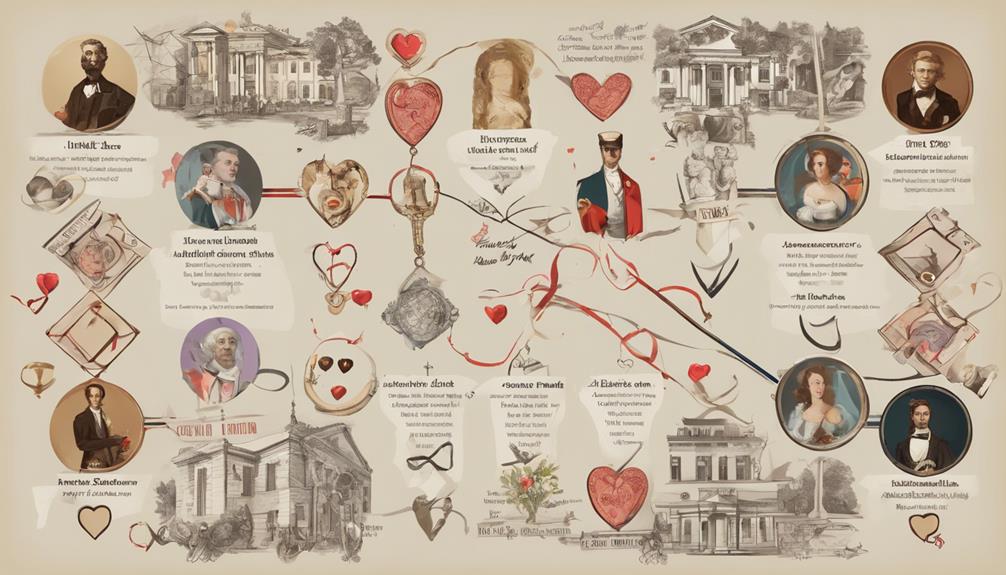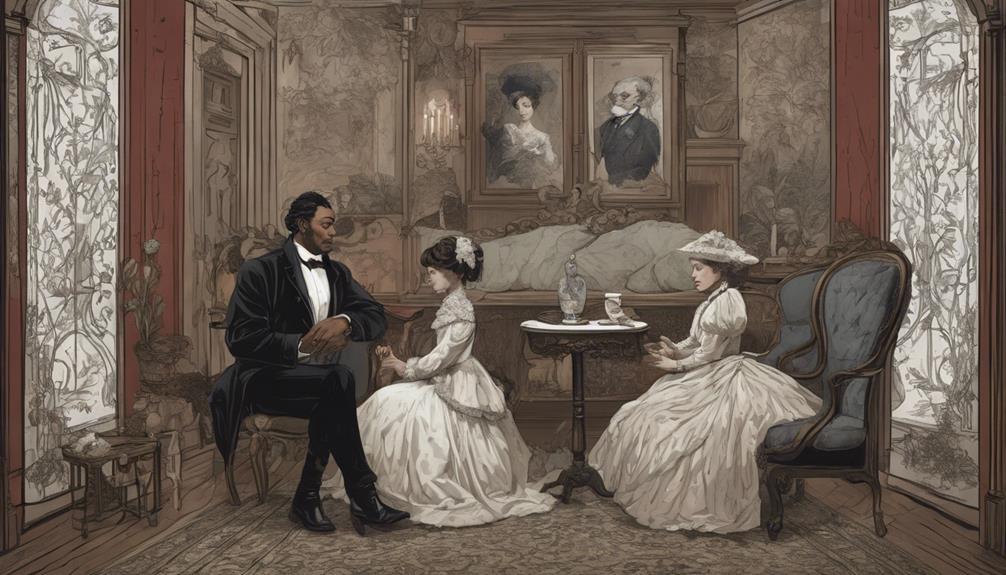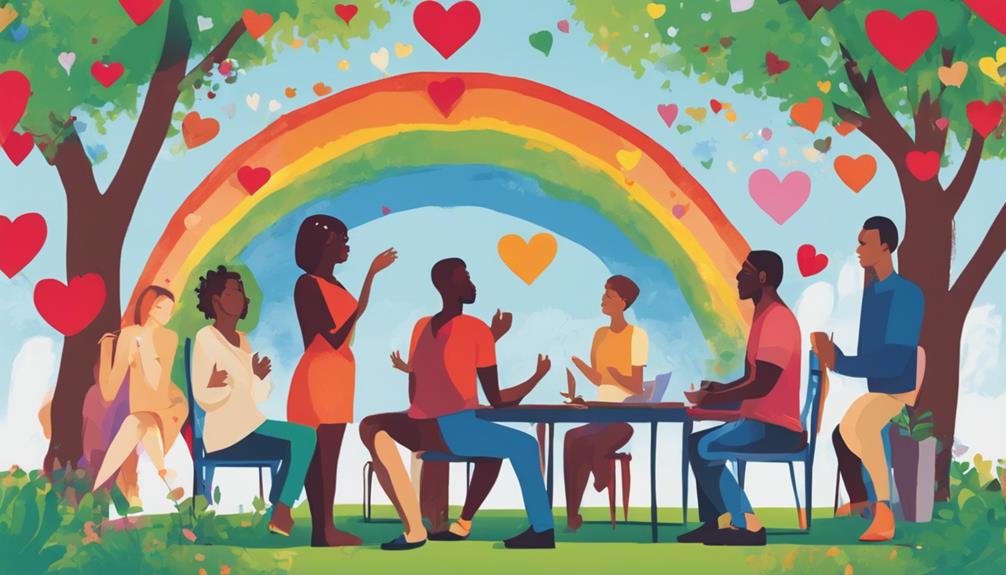Society's stance on extramarital relationships has evolved considerably. In ancient times, infidelity often received leniency based on gender, whereas Victorian ideals imposed severe moral judgments. Religious teachings have shaped views, with many condemning affairs, although progressive factions are emerging. Today, cultural norms are shifting, leading to a growing acceptance of non-monogamous relationships. Legal consequences also reflect these changes, as courts may factor infidelity into divorce proceedings. Media depictions further influence public perception, offering varied narratives. As you explore these transformations, you'll uncover the complexities that define modern relationships and societal attitudes toward infidelity.
Historical Perspectives on Infidelity

Throughout history, societies have grappled with the complexities of infidelity, often reflecting their cultural values and norms in the way they judge extramarital relationships.
In Ancient cultures, practices varied widely; some regarded infidelity as a minor transgression, while others imposed severe penalties. For instance, in ancient Rome, a man's infidelity was often overlooked, whereas a woman's was met with harsh consequences, highlighting a stark gender disparity in moral expectations.
Fast forward to the Victorian era, and you'll notice a dramatic shift in attitudes. Victorian society emphasized strict sexual morality, viewing infidelity as a societal ill indicative of personal failure. The emphasis on propriety and the ideal of the ‘domestic angel' shaped public opinion, leading to scandal and ostracism for those caught in extramarital affairs.
This period's attitudes were deeply rooted in the values of family and fidelity, contrasting sharply with the more lenient views of Ancient times.
Religious Impacts on Morality
How do different religions shape societal views on extramarital relationships and morality?
Religions often provide a framework for understanding ethical behavior, impacting how individuals perceive infidelity. Faith-based interpretations of scriptures frequently define marriage as a sacred union, promoting fidelity as a moral imperative. For instance, Christianity and Islam typically condemn extramarital affairs, framing them as violations of divine commandments.
These interpretations create moral dilemmas for adherents. When faced with extramarital temptations, individuals grapple with their desires against their faith's teachings. This tension can lead to feelings of guilt, shame, or even existential crises, as they navigate conflicting values. Additionally, religious communities often reinforce these teachings, creating social pressure to conform to established norms regarding fidelity.
However, interpretations can vary notably even within the same faith. Some progressive factions may adopt a more lenient stance, emphasizing personal happiness over strict adherence to traditional rules. This divergence complicates the dialogue around extramarital relationships and morality, suggesting that the impact of religion on these issues isn't monolithic.
Ultimately, your understanding of morality in this situation is likely shaped by your faith, community, and personal experiences.
Cultural Norms and Expectations

Cultural norms and expectations play a crucial role in shaping attitudes toward extramarital relationships, influencing how individuals perceive fidelity and infidelity within their societies.
You'll find that social taboos surrounding these relationships often dictate the behavior and choices of individuals. In many cultures, infidelity is viewed as a breach of trust, leading to strong societal condemnation and personal guilt. However, as norms evolve, some societies now exhibit a more nuanced understanding of relationship dynamics, allowing for greater acceptance of non-monogamy and alternative arrangements.
This shift often reflects broader changes in gender roles, individualism, and sexual liberation. You might notice that in regions where traditional views dominate, individuals face significant pressure to conform, leading to covert behaviors or hidden affairs. Conversely, in more progressive societies, open discussions about desires and boundaries can foster an environment where extramarital relationships are openly acknowledged, albeit still debated.
Ultimately, how you perceive extramarital affairs is shaped by the cultural context you inhabit. Understanding these dynamics can help you navigate your personal beliefs in relation to the prevailing social standards, allowing for more informed choices in your relationships.
Legal Consequences of Affairs
The legal consequences of extramarital affairs can considerably impact individuals, influencing everything from divorce settlements to child custody arrangements.
When you engage in an affair, you may find yourself facing significant ramifications under divorce laws. Many jurisdictions allow for the consideration of infidelity when determining property division and alimony, potentially resulting in a more unfavorable financial outcome for the unfaithful spouse.
Additionally, emotional distress caused by an affair can complicate custody disputes. Courts often aim to prioritize a child's well-being, and if your actions are seen as detrimental to that, it could negatively affect your custody rights. The emotional turmoil stemming from infidelity might also be a factor when determining the best living situation for children involved.
While some states recognize 'alienation of affection' claims, where the spouse of the unfaithful partner can sue the lover, this practice is increasingly rare.
Ultimately, you should weigh the personal and legal risks of extramarital relationships carefully. The implications extend beyond your marriage and can influence various aspects of your life, including your finances and your relationship with your children.
Media Representation of Infidelity
Media's portrayal of infidelity often reflects society's complex attitudes towards relationships, highlighting both the allure and consequences of extramarital affairs.
Through films, television shows, and literature, you see various narratives that frame romantic betrayal in ways that either glamorize or condemn the act. For instance, some stories might depict infidelity as a passionate escape, suggesting that the thrill of an affair can be more appealing than the stability of a long-term relationship. This infidelity portrayal can normalize such behavior, offering a seductive lens through which audiences view cheating.
Conversely, other representations focus on the emotional fallout, emphasizing the pain and destruction caused by betrayal. These narratives often serve as cautionary tales, illustrating the potential for heartbreak and loss that accompanies infidelity.
By alternating between these perspectives, media plays an essential role in shaping public opinion on extramarital relationships. As you consume these stories, consider how they reflect societal norms and values.
Ultimately, the media not only entertains but also influences your understanding of the complexities surrounding infidelity and the broader implications for personal and societal relationships.
Shifts in Gender Roles
In recent years, shifts in gender roles have considerably impacted societal views on extramarital relationships, challenging traditional expectations and altering how infidelity is perceived and experienced. As you observe the rise of gender equality, you'll notice that relationship dynamics have evolved, often leading to different commitment variations than in the past. Women and men are increasingly asserting their personal autonomy, reshaping the power balance in relationships.
With these changes, communication styles have also adapted. Open dialogue about emotional labor and needs is becoming essential, as partners seek to understand and support each other's desires. Societal expectations have shifted away from rigid gender norms, allowing both partners to express dissatisfaction or seek fulfillment outside the primary relationship without the same degree of stigma.
Infidelity is now often contextualized within the framework of unmet needs rather than moral failure, reflecting a broader understanding of relational complexities.
As you analyze these transformations, it's evident that the evolving perceptions of extramarital relationships will continue to play a significant role in shaping how individuals navigate their commitments and expectations in the future.
Modern Views and Acceptance

Modern society increasingly acknowledges and accepts extramarital relationships as complex intersections of personal fulfillment and relational dynamics, reflecting a shift towards understanding individual needs over conventional morality.
As you navigate contemporary relationships, you might notice that the stigma surrounding extramarital connections, including open relationships, is gradually fading. This evolution indicates a growing recognition that traditional monogamous structures may not meet everyone's emotional or sexual needs.
You're likely aware that societal taboos around infidelity are still present but are being challenged by more progressive views. Many people now view open relationships as valid alternatives, emphasizing communication and consent rather than deceit. This perspective encourages you to explore your desires without fear of judgment, fostering a culture that prioritizes honesty and mutual respect.
As acceptance rises, discussions about boundaries and emotional safety in these relationships become increasingly important. You might find that this openness helps reduce feelings of guilt or shame, allowing individuals to pursue happiness on their own terms.
Ultimately, the modern landscape of extramarital relationships reflects a broader commitment to personal agency, where your choices are informed by your unique circumstances rather than societal expectations.
Conclusion
In examining the evolution of society's stance on extramarital relationships, it's clear that perspectives have shifted considerably over time.
Historical, religious, and cultural influences shaped the morality around infidelity, while modern views reflect a growing acceptance of diverse relationship structures.
As gender roles continue to evolve, the implications of infidelity are being redefined.
Understanding these changes provides valuable context for steering contemporary discussions about fidelity and commitment, challenging traditional norms and encouraging open dialogue.
